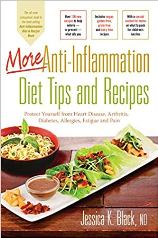Is Broccoli Anti-Inflammatory?
Published: January 16, 2019
Written by Dr. Jessica Black, a naturopathic doctor specialized in developing anti-inflammatory recipes, More Anti-Inflammation Diet Tips and Recipes contains several recipes that feature broccoli.
So, what's the deal with broccoli? Why do naturopaths, like Dr. Black, and nutritionists like Michelle Babb, who is a registered dietitian and the author of Anti-Inflammatory Eating Made Easy, include broccoli in their recipes designed to fight chronic inflammation?
Understanding Inflammation
Before we explore the purported anti-inflammatory properties of broccoli, let's take a step back and try to gain an understanding of what causes inflammation and why you should be concerned about it.
First, it is important to understand that there are different types of inflammation.
Acute inflammation is part of the body's natural immune response. It occurs when your body is infected or injured, and your immune system responds with an inflammatory response in which white blood cells migrate to affected area to fight the pathogen or repair the tissue damage. Once the stimulus has been removed, acute inflammation begins to cease.
However, sometimes the body's inflammatory response goes haywire and becomes persistent, resulting in chronic, low-grade inflammation. This type of inflammation has been linked to the development of a wide variety of conditions, ranging from heart disease and asthma to rheumatoid arthritis and inflammatory skin conditions like psoriasis.
Chronic inflammation is often associated with poor dietary habits, which has prompted nutritionists to develop anti-inflammatory diets plans. The science behind anti-inflammatory diets is simple: by eating more foods with anti-inflammatory properties, such as broccoli, and limiting your intake of pro-inflammatory foods such as processed meats you can reduce chronic inflammation.
Broccoli Has the Hallmarks of a Great Anti-Inflammatory Food
There are several reasons why broccoli seems to be a great addition to anti-inflammatory diets:
- A high intake of fruit and vegetables in general has been inversely associated with plasma concentrations of C-reactive protein (CRP) which is a key marker of inflammation (1).
- Broccoli ranks low on the Glycemic Index (GI), and research suggests that low-GI diets are inversely associated with inflammation (2). The low GI value of broccoli may also contribute to many other health benefits associated with eating broccoli.
- There is a strong link between obesity and chronic inflammation, and various diets that promote weight loss have been shown to reduce chronic inflammation in obese and overweight people (3). Broccoli is a great weight loss food because it is low in calories, high in fiber, and contains nutrients and phytochemicals that may help people keep their weight in check.
- Broccoli is an excellent source of glucoraphanin which is a precursor to a compound called sulforaphane. Sulforaphane has been associated with many health benefits, some of which may be linked to its apparent anti-inflammatory properties (4).
Eating Broccoli Has Been Shown to Reduce Some Inflammatory Markers
So, broccoli has all the earmarks of a winning anti-inflammatory food, but is it powerful enough to actually reduce inflammatory markers in humans?
Eager to find out, a group of scientists from the University of Milan in Italy conducted a dietary intervention study designed to evaluate the effects of a 10-day broccoli (250g/day) intake on inflammatory markers in young male smokers, and found that the broccoli diet decreased plasma CRP levels by 48 percent. However, there were no significant changes in the levels of other inflammatory markers, such as tumor necrosis factor alpha (TNF-α) and interleukin-6 (IL-6) (5).
In another study, consumption of cruciferous vegetables, a group that includes vegetables like broccoli and cauliflower, reduced the levels of circulating IL-6 in healthy, non-smoking men and women during the 14-day experiment; however, the results for other biomarkers of systemic inflammation were inconsistent (6).
Because IL-6 was the only inflammatory marker in which a reduction was consistently observed in this randomized crossover trial, Dr. Sandi Navarro, MSc, PhD, and her co-authors pointed out in their report that is possible that "this marker is more responsive than other markers to environmental factors, or that it responds more quickly" (6).
In yet another study, women who had higher intakes of cruciferous vegetables had lower circulating TNF-α, IL-1β, and IL-6 concentrations than women who had lower intakes of cruciferous vegetables, based on data collected from about 1,000 Chinese women using food frequency questionnaires.
This study also found an inverse relationship between the inflammatory markers and intake of all vegetables combined, but not when they only included non-cruciferous vegetables. (7)
The Bottom Line
To sum up, broccoli definitely fits the bill of a great anti-inflammatory food: it ranks low on the glycemic index, it has weight loss promoting properties, and it provides sulforaphane, a compound with anti-inflammatory properties.
Also the studies that have investigated the anti-inflammatory properties of broccoli, or cruciferous vegetables in general, suggest that broccoli could be a great addition to anti-inflammatory diets, though more research is needed to better understand how broccoli may affect chronic inflammation.

Written by Dr. Jessica Black, an expert in naturopathic medicine, "More Anti-Inflammation Diet Tips and Recipes" is the much-anticipated follow-up to Dr. Black's best-selling "Anti-Inflammation Diet & Recipe Book". In this sequel, Dr. Black provides tons of useful tips to help you kickstart an anti-inflammatory lifestyle, plus 150 mouthwatering recipes, each of which is accompanied by a full nutritional analysis. To learn more, see More Anti-Inflammation Diet Tips and Recipes.

